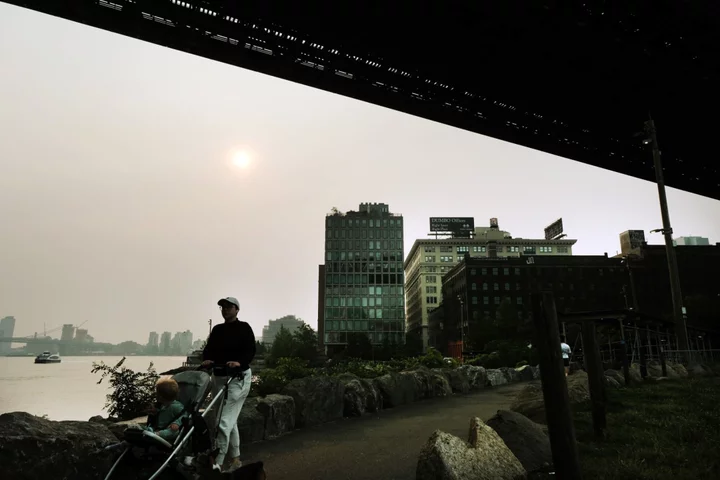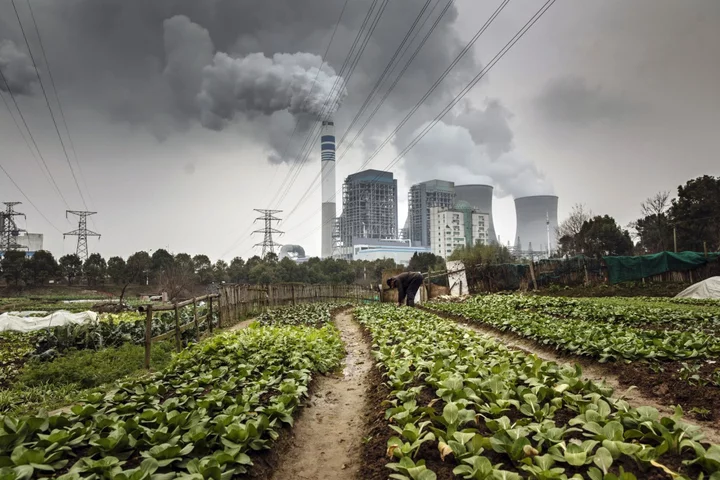(Bloomberg) --
New York City woke to an orange glow on Tuesday with the sun obscured by a thick blanket of unhealthy smoke drifting south from Canadian wildfires.
Hazy air blown in from distant fires has become a recurring phenomenon in New York over recent years, although mostly later in the summertime as wildfires spike out west. Government forecasters called the sooty scene across the city on Tuesday a “highly unusual scenario,” pulling in smoke from wildfires to the north in Canada. Wildfire seasons around the world are expected to become longer and cover more territory as global temperatures rise, raising the risk of impacts reaching places far from the burning.
Smokey conditions are drifting across North America as Canada experiences an unprecedented amount of pre-summer fire activity. “May was a record warm month across Canada,” said Daniel Swain, a climate scientist at the University of California Los Angeles. While wildfire season peaks at different times across Canada, Swain said this spring is unusual as fires have been burning from British Columbia along the Pacific to Nova Scotia on the Atlantic.
On Tuesday New York's five boroughs registered some of the worst air in the US. The government-backed online platform AirNow, which rates air quality getting progressively worse on a 500-point scale, showed levels reaching into the 150s. Conditions have been even worse in the Canadian capital of Ottawa, where levels nearly reached 250 on Tuesday with some of the worst air in North America. Health warnings urged people in both regions to limit outdoor activity.
Swain said the smoke pouring down into New York is coming from Quebec, and that helps explain why it’s so thick. Usually smoke that sweeps through the US Northeast is traveling from the far side of the continent. But over the past two weeks the fires have been burning just north of the border in eastern Canada. Air quality alerts have been posted across New York, all of New England except Maine, and throughout the Great Lakes and as far south as Maryland.
“This is a dense wildfire,” Swain said. “You are getting California-style dense plumes that are blowing south. These are more local fires, so the smoke is denser and they are causing more public health problems.”
As of June 5, there were 421 active fires are burning across Canada, according to the Canadian Interagency Forest Fire Centre, which counted more than 2,250 fires started year to date that had charred 3.6 million hectares.
Read More: Wildfires Poised to Burn More Land Than Ever in Canada This Year
The eerie orange cast to the Manhattan skyline isn’t the only alarming aspect of Tuesday’s weather far from the wildfires. Critical fire conditions spurred on by dry lightning have set up across eastern Pennsylvania and New Jersey, according to the US Storm Prediction Center. Red flag warnings have been posted in New Jersey and eastern Pennsylvania. Dry winds will sweep the area raising the risk of wildfires in the Northeast on Tuesday. “If a fire starts it can get out of control much more quickly,” said Joe Wegman, a forecaster with the US Weather Prediction Center.
“I cannot ever remember dry lighting in the Northeast,” Swain said. “It is certainly highly unusual.”
In other weather news:
England: London hasn’t seen rain in 22 days, close to breaking the previous longest stretch from last July when record-breaking temperatures scorched the capital.
Australia: Australia’s Bureau of Meteorology has moved to El Niño ALERT from El Niño WATCH, meaning that there is around a 70% chance of an El Niño developing this year, according to a statement.
Europe: Above normal temperatures will extend into next week across most of northern Europe, with cooler and wetter conditions dominating the south, according to forecaster Maxar Technologies.
(Updates throughout with potential health impacts, forecast details and quotes fromclimate scientistDaniel Swain.)









